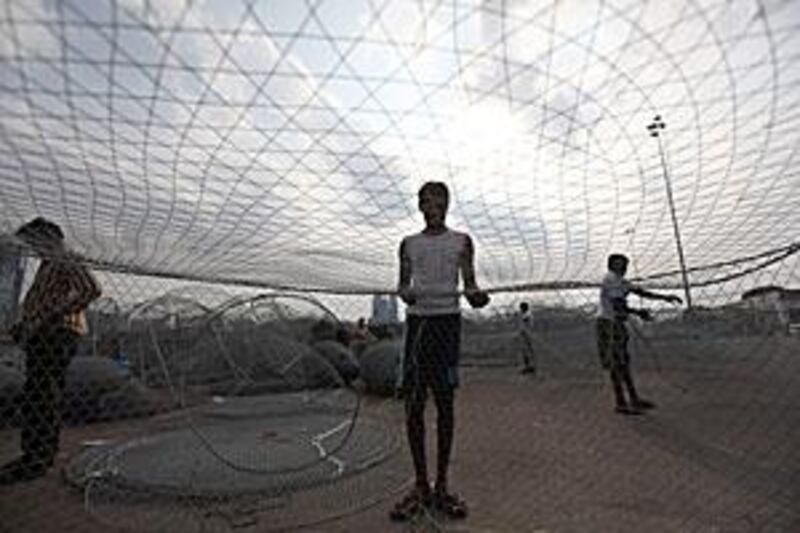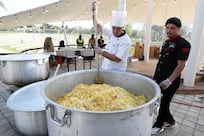ABU DHABI // The Government has not done enough to protect the nation's dwindling fish stocks and fishing industry, the Federal National Council says in a new report. The report, written by a multi-disciplinary committee that oversees foreign affairs, planning, petroleum, mineral wealth, agriculture and fisheries, says damage to fish stocks stems from the activities of commercial ships and oil tankers, which, it says, are destroying the marine environment by discharging harmful material that cause fish to migrate outside the Gulf.
Tankers have repeatedly spilled oil in the Gulf, especially near the coast of Fujairah. Some also discharge oil residue when cleaning their tanks before refilling. Furthermore, data released last year by the Environment Agency-Abu Dhabi show that nearly three-quarters of fish whose habitats are close to the ocean floor - including the hammour, which hide among rocks and crevices in coral reefs - are overfished, as are nearly half of other fish.
Scientists estimate that the necessary spawning stock biomass - the total weight of the fish in a stock old enough to spawn - needs to be at least 20 per cent if the species is to thrive. In 2001-2002, the spawning stock biomass was just 1.9 per cent for hammour, but it increased to three per cent by 2005-2006 because of protective measures taken by the environment agency. The report recommended further fishing subsidies and greater funding of fish-farming operations even as it concluded that lasting solutions were not easily identified.
Addressing members in a session earlier this week, the Minister of Environment and Water, Rashid Ahmed bin Fahad, accepted much of the responsibility for the state of the fishing industry but said other governmental authorities shared the blame. "I hope this subject is discussed with the presence of all parties - the Ministry of Social Affairs and local authorities," he said. Khalid bin Zayed al Falasi, an FNC member from Dubai and the committee's chairman, warned that the Government must act soon before fishing problems reach what he called "a dangerous crisis" in a few years.
"We're not asking the minister for magic solutions," Mr al Falasi said, "but we're hoping to have a proper solution to protect the fish stock and fishermen." Abdul Raheem Shaheen, a member from Ras al Khaimah, urged that federal ministries and local authorities work together to help fishermen and protect fisheries. "The minister didn't offer any solution," he said. "What would the representatives of fishermen present in this chamber say? Nothing has been offered; they would leave empty handed."
Dr Shaheen rebuked the ministry for not hiring Emirati experts and for depending on hired foreigners, but Mr bin Fahad said that his ministry had "more than 50 citizens specialising in all fields". Other members complained about the absence of Emiratis in the fishing industry. "The fishermen are Asians, the middlemen are Asians, the vendors are Asians," said Yousef al Nuaimi, a member from Ras al Khaimah. "What's left for the citizens?"
Ali Jasem, a member from Umm al Qaiwain, said: "The only ones benefiting from fishing are armies of Asians. Here is a reality imposed upon us, and we're unable to solve the problem." He said scarcity of fish and lack of subsidies to the industry had caused fish prices to soar. "In some of the emirates, a kilo of fish has reached Dh50," he said. "Do you know that some citizens who were used to eating fish have stopped?"
But other members, including Dr Shaheen, said the requirement for an Emirati on each fishing boat had caused dozens of boats to lie idle because they could not find the requisite lead fisherman. "If the minister goes to fishing harbours in Dubai and Sharjah, he will see boats docked for 20 days because there are no citizens to serve as a lead fisherman," Dr Shaheen said. Mr bin Fahad said it was the "security services" who required an Emirati on each fishing boat.
Mohammed al Zaabi, a member from Sharjah, said the Government needed to focus on protecting incubation sites. "There is no co-ordination with desalination plants, which produce a lot of salt that affects the mangroves and coral reefs," he said. "We know that it takes a whole year for the mangrove tree to grow 20 centimetres in the natural course, so imagine what happens when the water is polluted."
He also urged the Government to put the fishing industry high on its agenda so it could regain the important status it once enjoyed in Emirati society. "The fish stock was a source of income before and well after the establishment of the state for the citizens," he said. If there were a strategy to protect the industry, he added, this would not have changed. The committee reached most of its findings after surveying 103 fishermen on a broad range of issues. Ninety-five per cent of them asked for government subsidies to cover fuel, maintenance and fishing nets in addition to the Dh7,000 (US$1,900) that covers half the cost of a fishing dhow's engine. The total federal subsidy to fishermen amounts to Dh3.3m per year.
The committee report reproached the federal ministry for failing to encourage the fish farming industry, noting that aqua-farming amounted to 17 per cent of fish production in Saudi Arabia in 2004 and that Egypt had allotted nearly Dh22m for fish farming this year, while the UAE invested only Dh8.9m. The committee concluded that the relatively meagre investment in aqua-farming meant that the country would not meet its strategic goal of "developing the sources of fish stock."
The FNC will discuss the panel's suggestions this month. mhabboush@thenational.ae





